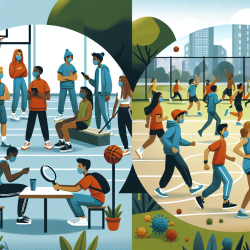In the realm of higher education, mental health challenges are on the rise. Students often grapple with anxiety, stress, and other mental health issues, making it imperative for institutions to explore effective interventions. One such promising approach is Animal-Assisted Interventions (AAIs), which include Animal-Assisted Therapy (AAT) and Animal-Assisted Activities (AAA).
Recent research, specifically the systematic review titled "Animal-Assisted Interventions for the Improvement of Mental Health Outcomes in Higher Education Students: A Systematic Review of Randomised Controlled Trials," sheds light on the potential benefits of AAIs. This review evaluated various randomized controlled trials (RCTs) and found that AAIs could offer short-term relief from anxiety and possibly stress among higher education students.
Understanding AAIs
AAIs encompass various structured and goal-oriented interactions between humans and animals. These interactions can be therapeutic, educational, or recreational, aiming to improve mental health and well-being. AAT involves trained animals and professionals working together to achieve specific therapeutic goals, while AAA provides more informal interactions aimed at boosting motivation and recreation.
Key Findings from the Systematic Review
The systematic review analyzed 11 studies, involving diverse settings and countries, and found promising evidence supporting the efficacy of AAIs in higher education. Here are some of the key findings:
- Anxiety Reduction: Several studies demonstrated a statistically significant reduction in anxiety levels among students who participated in AAIs compared to control groups.
- Stress Management: While the evidence for stress reduction was limited, some studies showed short-term benefits of AAIs in alleviating stress.
- Mood and Well-being: The impact of AAIs on mood and well-being was mixed, with some studies indicating positive effects, while others showed no significant change.
Implementing AAIs in Educational Settings
For practitioners looking to enhance their skills and integrate AAIs into their programs, here are some actionable steps based on the research findings:
- Structured Programs: Design AAT programs with clear therapeutic goals and trained professionals to guide the interactions.
- Informal Activities: Implement AAA sessions to provide students with opportunities for informal and recreational interactions with animals, which can help reduce stress and anxiety.
- Regular Sessions: Offer regular and accessible AAI sessions to maximize the benefits for students, ensuring the interventions are integrated into the broader mental health support services.
Encouraging Further Research
While the existing evidence is promising, there is a need for more robust and large-scale studies to conclusively determine the long-term benefits of AAIs. Practitioners and researchers are encouraged to conduct further research to explore the full potential of AAIs in various educational settings.
To read the original research paper, please follow this link: Animal-Assisted Interventions for the Improvement of Mental Health Outcomes in Higher Education Students: A Systematic Review of Randomised Controlled Trials.










